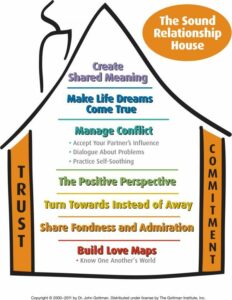Couples therapy can be incredibly effective for helping couples identify negative interactions and develop skills for improving satisfaction in their relationship. The Gottman Method is one approach to couples therapy developed by Dr. John Gottman and his colleagues to help couples communicate effectively.
What is the Gottman Method?
The Gottman Method is a research-based approach to couples therapy. Before the Gottman Method research, there was very little research on relationship dynamics. Dr. John Gottman and his colleagues conducted extensive research into how couples interact with each other. They utilized “love labs” where they would have couples go away for a weekend and be observed. Gottman and his colleagues wanted to determine predictors of divorce and marital satisfaction.
Gottman and his colleagues reported 90% accuracy in their ability to predict marital satisfaction (or dissatisfaction) based on the absence or presence of the “Four Horsemen”: Criticism, contempt, defensiveness, and stonewalling. Couples can promote greater relationship satisfaction by learning effective strategies for addressing these factors.
The Gottman Method Couples Therapy Approach
The Gottman Method is designed to help couples strengthen their relationships. While each couple’s situation has elements that make it unique, Gottman believes that all marital conflicts fall into two categories: they can be resolved or they are perpetual. Gottman also believes that almost 70% of marital conflict is perpetual, meaning they will forever be a part of the relationship, so the Gottman Method has a particular focus on these conflicts.
The approach of The Gottman Method is to strengthen the friendship, conflict management, and creation of shared meaning between the partners. A few of the benefits of applying The Gottman Method in couples therapy can include:
- Learning to replace negative conflict patterns with positive interactions
- Repairing past hurts
- Increasing closeness and intimacy
- Improving friendship
- Deepening emotional connection
- Enhancing the couples shared goals
The Sound Relationship House
Drs. John and Julie Gottman introduced the concept of “The Seven Principles of Making Marriage Work” by comparing secure partnership to a house. They called this the “Sound Relationship House.” These components, or “floors”, include the following:
- Build love maps – Ask the right questions to learn more about your partner
- Share fondness and admiration – Articulate the reasons you love your partner
- Turn towards instead of away – Be there when your partner needs attention, support, and comfort
- Have a positive approach to problem-solving and the success of repair attempts – Believe that you and your partner are on the same team
- Manage conflict – Take your partner’s feelings into account when a problem arises and have a dialogue about it
- Make life dreams come true – Encourage your partner to reach their goals
- Create shared meaning – Build and understand the world as a couple
Beyond “The Seven Principles of Making Marriage Work,” the Gottman Method stresses that these floors will not hold together without trust and commitment. The individuals in a partnership need to make the decision to stick with one another. The Gottman Method proposes that with these principles alongside trust and commitment, the individuals involved will have a strong, sound relationship.

The Four Horsemen
Another aspect of the Gottman Method is the Four Horsemen, which refer to aspects of relationship dynamics which can predict the end of a relationship:
- Criticism: when one criticizes their partner rather than offering a constructive critique or voicing their feelings. This is an attack on one’s partner at the core of the individual’s character.
- Contempt: goes further than criticism. Contempt assumes a position of moral superiority over one’s partner. This can look like sarcasm, ridiculing, name-calling, and using offensive body language such as eye-rolling. Contempt is considered the greatest predictor of divorce out of all of the horsemen.
- Defensiveness: refers to fishing for excuses and playing the victim so that one’s partner will back off. While it is understandable to want to stand up for oneself, defensiveness can lead one’s partner to believe that their partner does not take their concerns seriously.
- Stonewalling: when a partner withdraws, shuts down, and simply stops interacting with their partner.
The Four Horsemen Antidotes
All relationships experience conflict at some point. Conflict is not necessarily a predictor of the success or failure of relationships; instead, it’s the way the couple approaches the conflict that predicts their satisfaction.
If couples can manage their conflict more effectively, the relationship has a better chance of succeeding. The first few minutes of a conversation will almost always differentiate how the conflict will be resolved. A few examples of antidotes include:
- Gentle start-ups – Using “I” statements and expressing one’s needs
- Appreciation – Finding gratitude for one’s partner’s actions
- Taking responsibility – Offer an apology for any wrongdoing
- Self-soothing – Taking a break and spending time doing something soothing or distracting
Great Lakes Psychology Group is proud to have a large network of clinicians with a variety of areas of expertise – including The Gottman Method. Through professional development opportunities, Great Lakes Psychology Group has introduced The Gottman Method and other modalities to its clinicians. If you are interested in joining the GLPG network, contact grow@glpg.net.


